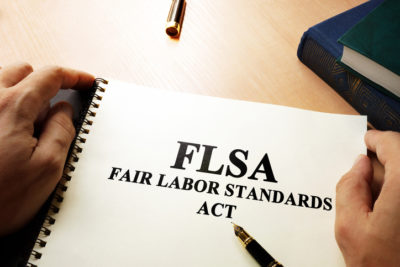An Ohio employee sued his employer for allegedly denying his request for paid COVID-19 leave when his doctor advised him to self-quarantine. His complaint also included a Fair Labor Standards Act (FLSA) collective action for wage and hour violations—highlighting a growing trend that presents a potential pitfall for employers.

Lawsuit Allegations
Blaire Woodward works as an hourly tree care technician in Ohio. After he came in contact with an individual who was later diagnosed with COVID-19, his doctor advised him to self-quarantine for two weeks. His employer allowed him to take leave but refused to pay him for it.
Woodward sued to recover the paid leave. In addition, he filed an FLSA collective action as well as a class action under the Ohio Minimum Fair Wages Standards Act (OMFWSA), based on allegations 50 employees weren’t paid their required overtime wages. Woodward v. Vancuren Servs., Inc. (N.D. Ohio, 1:20-cv-1818).
Growing Trend
Woodward isn’t alone in adding a wage and hour collective or class action to a COVID-19 leave claim:
- Two Georgia servers sued after they were allegedly fired because they requested paid leave for their COVID-19 symptoms. They also filed an FLSA collective action for minimum wage violations. Henderson v. Lindsey’s Culinary Market LLC (M.D. Ga., 3:20-cv-109).
- A South Carolina server sued after he was allegedly fired because he left work to seek medical treatment for COVID-19 symptoms. He also filed an FLSA collective action for minimum wage violations. Mackie v. Coconut Joe’s IOP LLC (D.S.C., 2:20-cv-2562).
- A New Jersey landscaper sued after his employment was allegedly terminated because he became ill with COVID-19. He also filed an FLSA collective action for unpaid overtime wages. Arias v. High Tech Landscapes, Inc. (D.N.J., 3:20-cv-7046).
Employer Obligations
The Emergency Paid Sick Leave Act (EPSLA) and the Emergency Family and Medical Leave Expansion Act (EFMLEA) require most employers to provide paid and/or unpaid COVID-19 leave to their employees. The laws are complicated, and only the highlights are summarized here.
EPSLA. The EPSLA requires all public agencies and private employers with fewer than 500 employees to provide paid sick leave to most employees who can’t work (or telework) because they:
- Have symptoms of COVID-19 and are seeking a medical diagnosis;
- Are advised by a healthcare provider to self-quarantine because of the virus or are caring for an individual who has been so advised;
- Are subject to a government-issued COVID-19 quarantine or isolation order or are caring for an individual subject to such an order; or
- Are caring for a child whose school or daycare center is closed or whose care provider is unavailable because of coronavirus precautions.
Full-time employees are entitled to up to 80 hours of paid sick leave. Part-time employees are entitled to the number of hours that they work, on average, over a two-week period. Pay rates depend on the reason for taking the leave. Special rules apply to workers with varied schedules.
Employers cannot require employees to use other paid leave first or find a coworker to cover their shifts. Employees are entitled to maintain their health coverage and have their jobs restored to them when they return. It’s unlawful to discharge, discipline, or discriminate in any other manner against individuals who request or take EPSLA leave.
EFMLEA. The EFMLEA requires employers with fewer than 500 employees to provide most employees who have worked at least 30 calendar days with up to 12 weeks of leave if they cannot work (or telework) because they’re caring for their child whose school or daycare center is closed or whose care provider is unavailable because of a government-declared public health emergency.
The first 10 days of EFMLEA leave may be unpaid unless the employee elects to use accrued vacation, personal, or medical or sick leave. After that, the employer must provide paid leave based on normally scheduled hours and a two-thirds rate of pay, up to a daily maximum of $200 and a total of $10,000. Employees on EFMLEA leave are entitled to maintain their health coverage and have their jobs restored when they return (with some exceptions).
Takeaways
To avoid wage and hour lawsuits, you should carefully comply with your leave-related obligations under the EPSLA and the EFMLEA.
Caroline H. Gentry is a partner with Porter Wright Morris & Arthur LLP in Dayton, Ohio. You can reach her at cgentry@porterwright.com.
